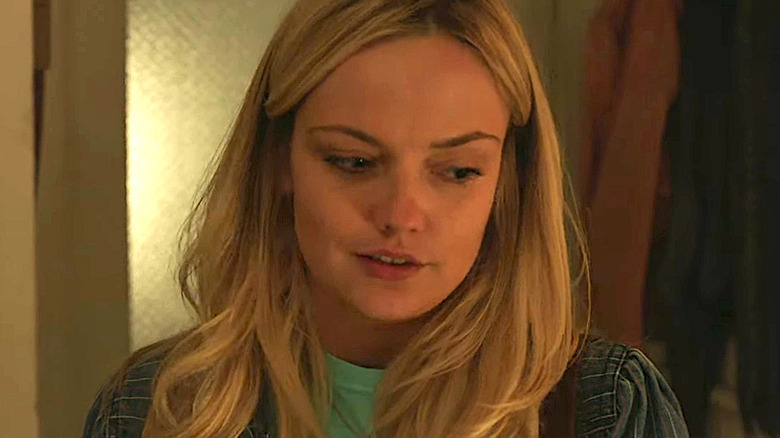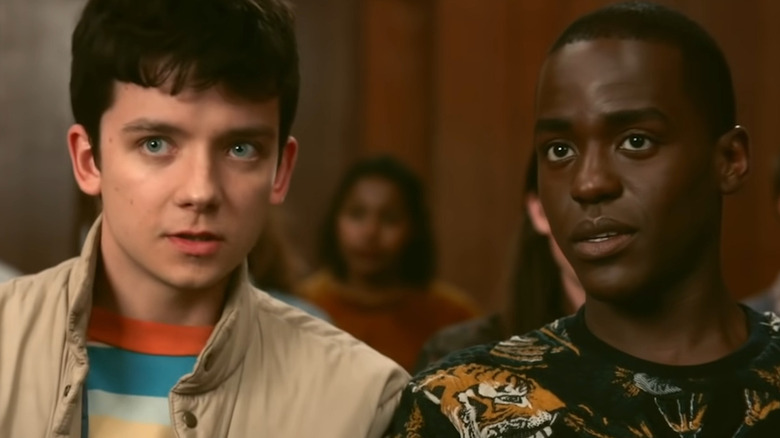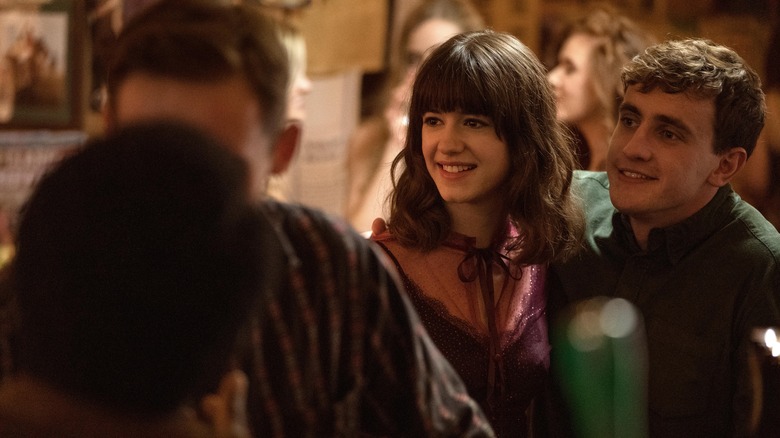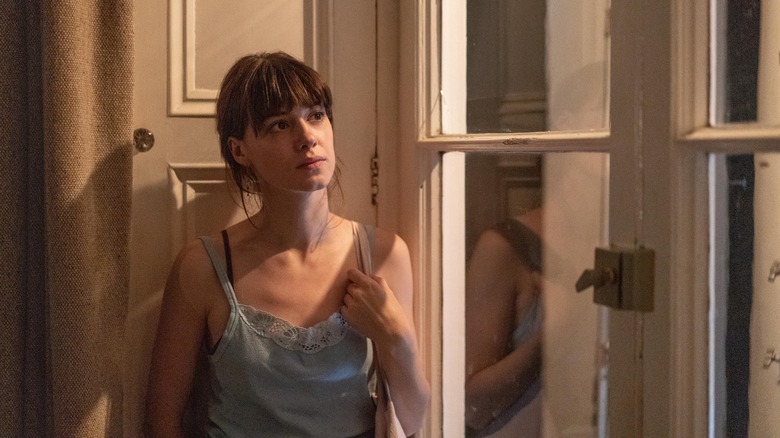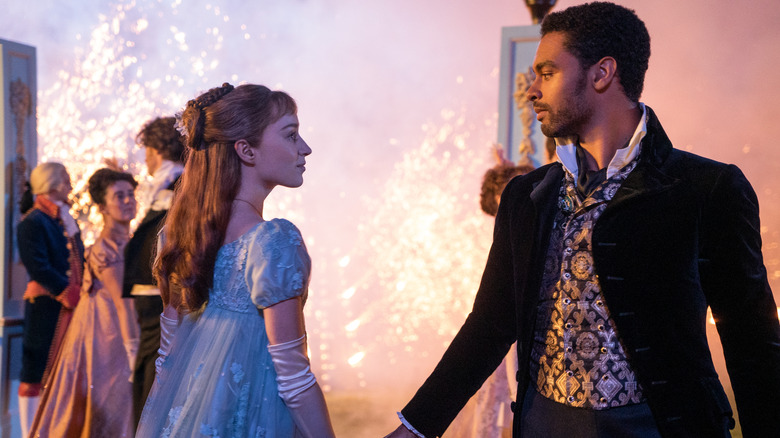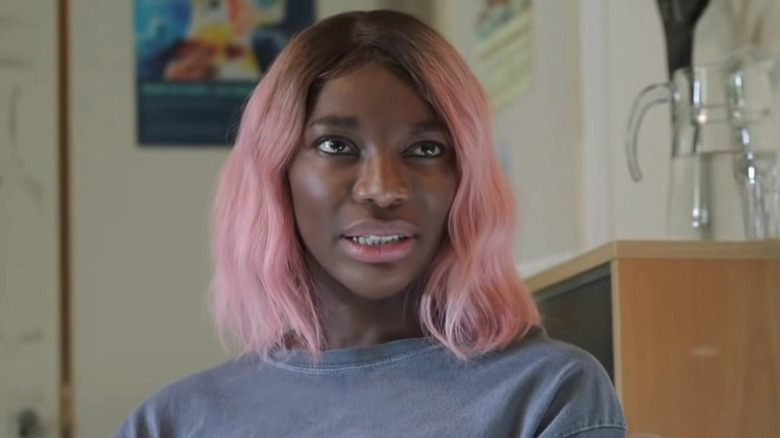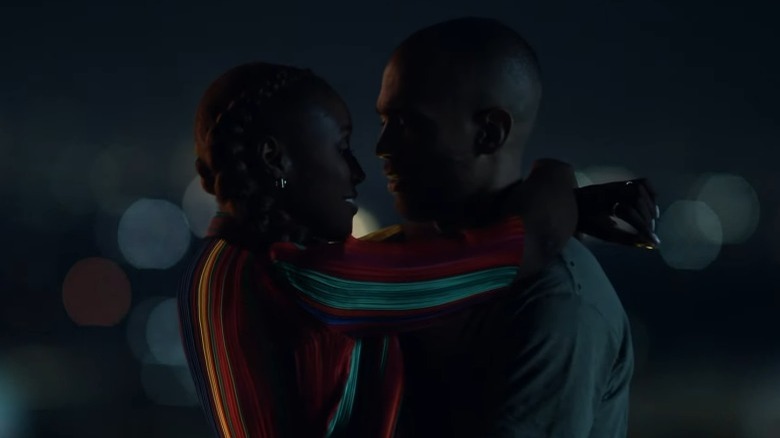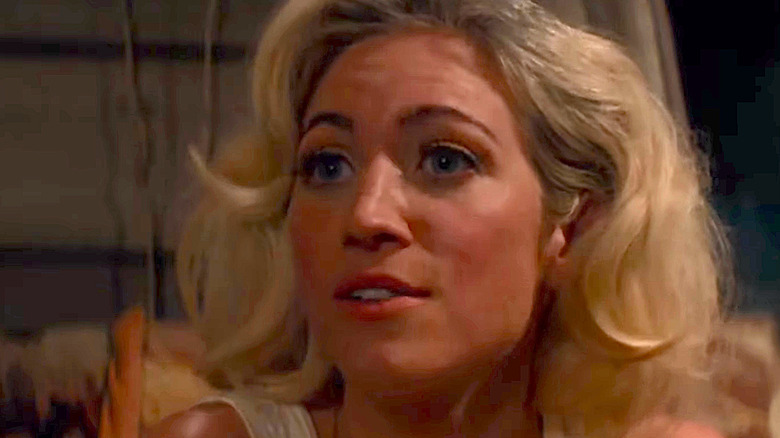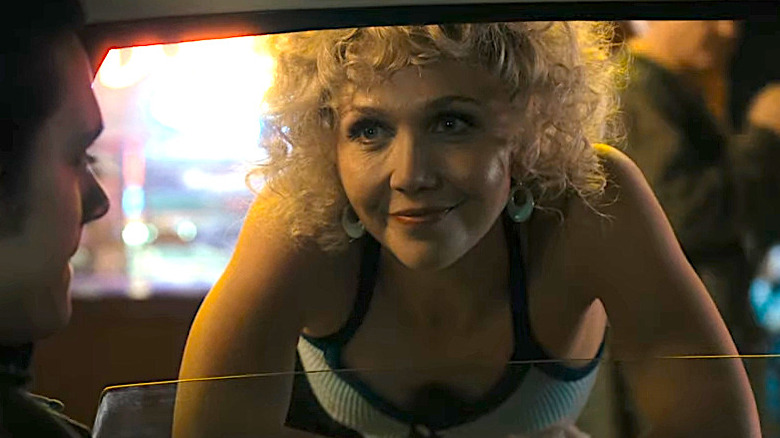Intimacy Coordinators: The New Group Of Experts Poised To Change Hollywood Forever
We all accept that "movie magic" is at play when watching movies or TV shows featuring scenes of glorious battles or dragons in flight. However, what movie magic is required when the dragon rider and the knight share a kiss? Hollywood understands that fight, dance, and stunt choreography are key elements of a memorable and safe production. But when it comes to scenes of an intimate nature like a tender kiss -– or one in a busy brothel -– not so much. At least, not until recently.
Intimacy coordinators are the new experts poised to change Hollywood forever. While they've existed formally for a decade, they've only recently spent time in the limelight. Intimacy coordinators stage and design intimacy with the same care fight coordinators use to stage screen violence — and some people are mad about it. "Game of Thrones" actor Sean Bean told the Times of London he thought that intimacy coordinators would "spoil" spontaneity on set, and the natural way lovers behave would be ruined by someone bringing it right down to a technical exercise.
Bean's comments swiftly sparked reaction. Actress Emma Thompson told an Australian podcast Fitzy and Wippa, "You can't just let it flow. There's a camera there and a crew. You're not on your own in a hotel room." Rachel Zegler, star of Steven Spielberg's "West Side Story" tweeted her gratitude for intimacy coordinators on set, "They showed grace to a newcomer like myself + educated those around me who've had years of experience. Spontaneity in intimate scenes can be unsafe. Wake up."
Still, Bean's view isn't uncommon among old-guard actors and directors. SAG-AFTRA only published guidelines regulating the practice in 2020, defining the role of an intimacy coordinator. So what makes intimacy coordinators so important when it comes to staging simulated sex acts, and why is their role so important -– and debated –- right now?
Sets without intimacy coordinators can be battlegrounds
Sean Bean lost his cool about intimacy coordinators long after his character Ned Stark lost his head on "Game of Thrones." Made before HBO's 2018 intimacy coordinator mandate (via Deadline), the show has a fraught history with intimacy. Gemma Whelan, who played Yara Greyjoy, told The Guardian that sex in Game of Thrones "could be a sort of frenzied mess." Emilia Clarke, who played fiery queen Daenerys Targaryen, spoke on Dax Shepard's Armchair Expert podcast about how the lack of direction in intimate scenes made her feel terrified.
Clarke thanked her co-star Jason Momoa for the protection he provided her when filming intimate scenes. Clarke told Armchair Expert, "He was always like, 'Can we get her a f***ing robe? She's shivering!'" Momoa faced his own lack of intimacy coordination on-set, revealing in "Game Of Thrones" oral history "Fire Cannot Kill a Dragon" that David Benioff pushed the actor to remove his 'intimacy pouch' during filming (via Decider), joking that Momoa should "Sacrifice! Do it for your art!"
Clarke's trial by dragon fire on the "Game Of Thrones" set changed her approach to intimate scenes later in her career. She admitted in "Fire Cannot Kill a Dragon" that she felt like she was too inexperienced an actress to push back on nudity requirements then, but told Dax Shepard now she "fights on set where I'm like, 'No, the sheet stays up."
What an intimacy coordinator does
Intimacy coordinators act as physical choreographers of what can be psychologically intense moments on stage and screen. They act as a facilitator of communication between many players on set. They are not therapists but are trained to handle conflict resolution and recognize signs of trauma to help navigate triggering situations. They work with actors, costume and camera departments, and the director to create effective ways of simulating sex acts. They get all of it in writing –- consent is now a key component of a performer's contract and thereby protected by an added layer of legality.
"An intimacy coordinator is somebody who brings a clear structure and a process when choreographing intimate scenes in both theater, TV, and film," Ita O'Brien, a pioneer in the intimacy coordination field, expressed in a video from The Guardian about her work on Sally Rooney's "Normal People." Gaby Labotka, intimacy director for the Tony Award-nominated "Paradise Square," agrees. "We facilitate consent between performers in order to simulate intimate actions or stories within the director's vision, without sacrificing people's emotional, physical or mental safety," Labotka tells Looper. "We try to mitigate any harm or risks that might come with these sorts of really vulnerable stories and vulnerable pieces of storytelling."
"We give people tools to be able to name the boundaries that they have," Labotka adds. "Often in the arts, we're trained to believe that we're not allowed to have boundaries, or someone else will take our job. So I try to find ways to respect boundaries so we can get the best performance and meet the vision without sacrificing people's well-being." The name of the intimacy coordinating game is empowerment and care. This can frighten old-school creators who work on impulse, but ultimately this coordination expedites the filmmaking process and keeps actors safe on set.
The Deuce started it all
The first show to officially employ an intimacy coordinator was HBO's "The Deuce" (via The Hollywood Reporter). It's a show about 1970s sex workers made in 2018, right as the #MeToo tides were turning and consent was becoming a watchword on sets. The new role was created for "The Deuce" after actress Emily Meade was asked to do a graphic, fully-nude oral sex scene. She hadn't shot anything like it before and was concerned. "Especially with the Internet, there's going to be images of me, topless, pretending to give oral sex for the rest of my life," she told The Washington Post.
Meade asked HBO for help navigating the scene. HBO hired Alicia Rodis, then known for her work in fight choreography, to assist. Together, Rodis and Meade came up with a new creative solution for the scene that resulted in Meade feeling more agency in the role and all creative departments adjusting to meet the vision while protecting Meade's vulnerability. HBO soon hired Rodis to serve as intimacy coordinator for all HBO productions. "The Deuce" showrunner David Simon (creator of "The Wire" and "Treme") was enthusiastic about the change, telling Rolling Stone he would always work with intimacy coordinators in the future.
Other shows and networks soon followed the lead of "The Deuce." "Sex Education" on Netflix credited their first intimacy director in 2019. Amazon, Hulu, and Showtime quickly followed suit. Rodis formed Intimacy Directors International with Tonia Sina and Siobhan Richardson. After its 2020 closure Rodis, Jessica Steinrock, and Marie Percy formed Intimacy Directors and Coordinators.
Meade told The Washington Post she is proud of the changes her bold ask brought to her industry. "All changes come from something being a problem first, and someone or people decide to change it. So this is actually the proudest thing I've ever been a part of in my career, being a part of that change," Meade said.
A day in the life of an intimacy coordinator
So what does a day's work look like when it comes to coordinating intimacy? While the workday tends to vary, every aspect of intimacy coordination requires communication, creativity, and check-ins regarding consent — plus plenty of paperwork. Intimacy coordinators start their projects by learning scripts, getting a feel for the vision and tone the director is working towards, as well as discussing tactics with actors and costume departments. Above all, intimacy coordinators facilitate discussions about consent and respecting boundaries in pursuit of a creative goal. The goal — shooting simulated sex or other intimacy — often leaves room for interpretation.
As Alicia Rodis told The Washington Post, "You might see a script that reads, '[The actors] are making passionate love on the sofa,' " she said. "So, what does that mean? What does that entail?" She then makes sure "conversations between the director and actors are had beforehand. Also making sure that we know exactly what the actors have agreed to nudity-wise, so they are not suddenly put in a position where they have to say 'no' in the moment, since there's a huge power dynamic on sets."
Intimacy coordinators enable consensual creativity
Issues like comfort and consent can seem trivial –- or even luxurious –- on fast-paced film sets where time is money. It is the job of an intimacy coordinator to facilitate consensual creativity in the face of time and budget constraints without sacrificing the performers or the quality of their performances. "Every actor I have spoken to about this, and I've spoken to hundreds, male or female or gender fluid, has a story being in a moment of intimacy and having a negative experience, ranging from uncomfortable to traumatizing," Intimacy Coordinator Claire Warden told The Huffington Post. "When you're doing a fall, you ask for a mat. We don't want to break the actor. Well, we don't want to break the actor emotionally or psychologically either."
Once clear working boundaries and consent are established, intimacy coordinators work on meeting the director's sought-after tone and vision by choreographing the intimacy with the actors. Together, the creative team develops an agreed-upon set of actions and limitations to allow performance to flourish. Gaby Labotka explains to Looper, "I am not here to neuter the impulses that a director or actor might have. I'm here to help facilitate to make sure that everyone consents to whatever those impulses are, and that we turn those impulses into choreography. By making sure that there is a physical script that everyone can understand, it allows actors to play deeper and harder with emotions and performance, because the expectations are clear."
#MeToo created the demand for intimacy coordinators
While it's heartwarming to think Hollywood sought out intimacy coordinators out of concern for the people that power its industry, the truth is more hardline: no one wants a lawsuit. Someone sinister influenced Hollywood's safer fake sex seachange –- and his name is Harvey Weinstein. While the #MeToo impact stretches far beyond Weinstein's misdeeds (via BBC), it was the sexual assault and misconduct allegations against the former movie mogul that shook the film industry to its core.
While intimacy coordinators existed before #MeToo, especially in live theater, they saw increased demand around Weinstein's scandals breaking big in 2017. Actress Salma Hayek alleged in The New York Times that Weinstein not only demanded sexual favors from her but forced her to shoot a full-frontal nude scene in "Frida" as punishment when she refused. #MeToo allegations range in extremity, but the Weinstein stories highlight how unchecked power on sets often proves disastrous. With #MeToo, sexual misconduct in film and TV production went from being whispered about in back rooms to global news, and sets scrambled to hire intimacy coordinators (via The Conversation).
In 2018, industry giant HBO mandated that all film and TV under its banner be produced in partnership with intimacy coordinators, as announced by Rolling Stone. Since the shift, consent is increasingly a matter of legality. Actors and agents negotiating contracts now have specific language in place for their protection and any changes made can affect a project's bottom line. Intimacy coordinators communicate these boundaries on and off-set both as a creative matter and a legal one.
How do you solve a problem like a sex scene
With monstrously unregulated megalomaniacs on one end of the film industry and litigation-weary buzzkills on the other, how can intimacy coordinators keep their sets fun, creative, and safe? Wouldn't it be simpler to let actors just be as "real" as possible? Let Marci Liroff, who worked as an intimacy coordinator on "Hightown," set you straight. "This is not porn. This is make-believe." Liroff told Variety. Tonia Sina, another groundbreaking intimacy coordinator, agrees, telling The Huffington Post, "Stage sex is nothing like real sex. It's fake. It has to be taught, and it has to be choreographed separately."
Gaby Labotka expands on this, telling Looper, "The problem that I have with this idea of it being 'real' is that what we're doing is literally fake. I think sometimes people conflate 'true' with 'real' when it comes to the artistic spirit of an action. That then causes problems because then we seek reality as opposed to seeking truth. And that's where we get hurt."
So, when it comes to simulating sex acts, wouldn't it just be cheaper and easier for directors to just tell actors to "have fun with it" and then buy everyone pizza? Not necessarily. "Have fun with it" can mean many things to many people. To avoid a wide interpretation, intimacy coordinators help establish standards when it comes to practicing simulated intimacy.
Industry standards ensure consent and safety
The standards intimacy coordinators set don't seek to proscribe an exact way all sets must express physicality, but rather guidelines to keep sets safe. Ita O'Brien's "Intimacy on Set Guidelines" are a de facto industry standard and provide framework boundaries for productions to adhere to regarding communication, planning, and changes. SAG-AFTRA released their own Standards and Protocols for the Use of Industry Coordinators in 2020. Updated protocols, standards, and accreditation systems are in a state of constant revision, reflecting the dynamism that defines intimacy-related work.
"When you have a profession where people have to touch each other at their job, there need to be rules around that," Sina insists to The Huffington Post. Prominent intimacy coordinator Lizzy Talbot agrees. "When it came to intimacy, there weren't any [rules and protocols initially]. It was just really interesting seeing the dynamic between the fact that there were all of these rules and regulations for violence and yet none for intimacy," she told CNN.
Talbot acted as intimacy coordinator for "Bridgerton," and actress Phoebe Dynevor expressed the benefits of more protocols being followed under Talbot's intimacy work in an interview with Grazia magazine. Dynevor explained, "'My first-ever scene was in episode six, where Simon is going down on Daphne. And it was so great, because it felt safe and fun: you choreograph it like a stunt, or a dance. It's crazy to me that that hasn't been there in the past. I've done sex scenes before that I can't believe I did: it was only five or six years ago, but it would not be allowed now."
Defusing trauma bombs
It's not hard to imagine traumatizing experiences that can happen on set when intimacy is mishandled, and Hollywood never seems to run dry of these particular horror stories. But what about traumas that happened off-set that are triggered by actions witnessed on or participated in on-set?
Michaela Coel is the writer and star of "I May Destroy You," a drama revolving around themes of sexual assault. Ita O'Brien served as the show's intimacy coordinator and was explicitly thanked for her work in Coel's 2021 BAFTA acceptance speech (via BBC). "Thank you for your existence in our industry, for making the space safe, for creating physical, emotional, and professional boundaries so that we can make work about exploitation, loss of respect, about abuse of power, without being exploited or abused in the process," Coel said in her powerful speech about intimacy.
O'Brien discussed the delicate process used for shooting scenes of sexual assault with Harper's Bazaar, saying, "Of course, there's a possibility that this could be triggering, and that's not just for the people who are performing, but it could be anybody who's involved; it could be the wardrobe person or someone watching on set ... even people working in the office."
Gaby Labotka describes the importance of mental health first aid training in relation to intimacy coordination, telling Looper, "People might have PTS that they don't necessarily know, or maybe they do know that they might have a flashback. Perhaps they didn't anticipate having one. Being able to help in those moments means someone doesn't feel the need to push through it or harm themselves further in order to keep on working. Care is about recognizing some of the signs of an episode, and also having resources to give to the individuals so that they can seek further care, if they need it beyond the check-in or the steps that we do."
Diversity and inclusion in intimacy coordination
Intimacy coordination is a relatively new field, and while it is diverse, it is overwhelmingly populated with cishet white women. While that isn't problematic on its face, the longer the field exists and the more coordinators there are with a wealth of experiences, the better real life will be reflected — both behind the scenes and on-screen. "Making sure that there is representation in the room is incredibly important," intimacy coordinator Sasha Smith tells The Hollywood Reporter. "As a Black woman, I'm always an advocate for diversity and inclusion ... not just BIPOC but also disabled bodies and trans bodies."
Smith spoke about the responsibility of her role to Elle, stating, "If you look at the roles usually given to Black people, it's usually a narrative surrounded around trauma. That is something that already lives in our bodies based on the society we are in. ... Having the tools and language to be able to cut through that energy and recognize where the tension is being held [helps] redirect how we're crafting the scene, so [that] we don't have to live in the heaviness of it."
Mia Schachter, a leading intimacy coordinator, encountered the need for more inclusive intimacy coordination on HBO's "Insecure," as they explained to The Hollywood Reporter. Schachter was acting as the intimacy coordinator during a shoot in which a white director was overseeing a scene involving two Black actors. The director instructed the male actor to run his fingers through his female costar's hair, which prompted Schachter to reach out to a Black colleague to ask if this was a situation that should have been cleared by an intimacy coordinator. "She told me, 'Yes, because that's not how Black people show care and intimacy and love.' This reinforced for me that I'm not the right person for every gig and that we desperately needed further representation in the field in Los Angeles," Schachter recalled.
How to become an intimacy coordinator
While standards and accreditation systems evolve constantly, a handful of intimacy coordinator training programs exist. Chief among them is Intimacy Directors & Coordinators, with a clear pathway to certification treated as the current gold standard in the film industry. Training to become an intimacy coordinator is as pricey as it is rigorous and centered mostly in LA, NY, and Chicago in the US, as well as major metro areas in the UK.
Many of the premiere programs have been developed by leading industry intimacy coordinators, fresh from major projects. Mia Schachter tells Broadway World the major US centers "Require set experience, and they train in specific methods of communication, getting and gauging consent and boundaries, choreography, basic film and cinematography vocabulary, mental health first aid, and so on. We learn the kinds of touch that indicate different themes in sexual scenes."
Many actors with movement experience, such as dance and fight choreographers, are drawn to this work. Gaby Labotka tells Looper her background in movement choreography has provided her with a dynamic base to work from when it comes to designing intimacy. "Fight choreography certainly gave me a head start when it comes to masking or stacking of certain actions. A lot of fight choreography is sleight-of-hand and misdirection. So that has helped me with physical storytelling for naturalism purposes. Dance has helped me when it comes to the musicality of the story that we're trying to tell when it comes to compositionally. It's storytelling through human bodies and I think the fighting, dance, intimacy –- they're all cousins, if not siblings."
Actors helping actors
Many intimacy coordinators were (or are) actors themselves. Many also have their own negative experiences of spontaneous scenes and intimate demands that went wrong. Intimacy coordinator and former actress Alicia Rodis told Men's Health that she first noticed a discrepancy between the level of involvement of choreographers in different types of scenes when she would prepare for stunts.
Rodis explained that when prepping to perform something like a high fall, she would always work closely with stunt coordinators who ensured that both the performer and the crew knew what to expect. However, this was not the case for scenes that were of a more intimate nature. Rodis recalled, "And then I would go in to do a scene of intimacy — be it stimulated sex or nudity — and I didn't have anyone ... There was no set vocabulary. There was no real protocol around how they were doing these scenes. So I saw that as an opportunity of, 'I think this is really needed.'"
Intimacy coordinators are taking that opportunity and running with it to create safer sets for the present generation. These concerns are present whether a film is depicting a simple embrace in a family drama or a slasher horror story that takes place during the making of an old-school porno film, as in Ti West's "X." As Brittany Snow explained to Collider, "I felt safe because there was so much consideration and care about every single shot in that movie. Nothing was shown that wasn't talked about at length beforehand." Snow continued, "There was an intimacy coordinator on set, Tandi Wright ... who was an angel and made sure that everything was based in character and not gratuitous sort of shock and awe. I think that was necessary for me to do the movie."
Directors need intimacy coordinators
Actors may be the most obvious beneficiaries of a good intimacy coordinator, but directors stand to gain just as much from their work –- if they can stomach sharing the spotlight. Filmmaking is a collaborative art form, but one still haunted by "auteur" ideals. However, rewards abound for directors willing to incorporate their performers and intimacy coordinators into the project they are making together.
David Simon, who was initially hesitant to bring Alicia Rodis onto "The Deuce," ultimately sang her praises to IndieWire. Ed Guiney, executive producer of Hulu's "Normal People," was also concerned an intimacy coordinator would disrupt the delicate relationship between the director and actors. On the contrary, the actors loved working with O'Brien. Guiney told The Hollywood Reporter he was pleasantly surprised at how the process "frees the actors up to properly be in the moment."
"Dead to Me" showrunner Liz Feldman was relieved to work with an intimacy coordinator on a make-out scene between teenagers. "You write something on the page, and you're like, 'Oh, that's going to be great. It'll be really sexy.'" Feldman told The Hollywood Reporter. "And then you're there on the day, and you realize, 'I'm basically asking these people to become incredibly intimate with someone that they've just met and to do it over and over again in front of a crew.'" Intimacy coordinators take responsibilities and liabilities off of creators' plates -– and can relieve any creepy sexual pressure so that stars young (and old) can make out on screen in peace.
No more game of groans
Years after it burned to the ground, Westeros lives again in the "Game Of Thrones" prequel series "House of the Dragon." Thankfully, the realm's loose standards of intimacy coordination do not. Miriam Lucia works as an intimacy coordinator on the show and was pressed into service when young actress Emily Carey became scared of shooting her first-ever intimate scenes (via Newsweek). Carey, just 17 at the time she was cast, was scripted to engage in a simulated sex act with the 47-year-old actor Paddy Considine.
"There was a lot of preparation before shoot day," Lucia tells Deadline. "In the past, a director would say in the moment, 'yeah, you know what, actually, I think it's better if she takes her shirt off now,' or, 'actually, just go for it guys, see what happens.' You can't do that anymore." Carey was thankful for Lucia's work, telling Newsweek, "To be able to talk everything through and not be shunned, or not feel awkward ... was a massive help and on set she was a massive help."
HBO is far from where it started when it comes to intimacy, but Lucia keeps a clear head about how there are always vulnerable individuals to watch out for in her line of work. She tells Deadline, "I am acutely aware that young men often are just as nervous, and wary, and not sure about trusting what's being asked of them. So, I try and remember that."
The future of intimacy coordination
Rather than banking on a star having a gentle co-star or an understanding director, Hollywood seems finally committed to structural and systemic change to uplift creative teams and their boundaries. Intimacy coordinators are now not considered bells and whistles but more and more a necessary part of any production. In some cases, they are part of a corporate mandate.
"This is not a trend," Gaby Labotka tells Looper. "I think we're going to be as integral to film sets as stunt coordinators are. Intimacy coordinators are technically their own department when they're on set. I think people who feel that this is a fad must not have been paying attention to the last five years because it's only grown. And it's only grown because it's working. It's grown because it makes not only the culture of sets better, but ultimately, it makes the craft better. It makes the film better."
The role of intimacy coordinator increasingly empowers the most vulnerable in this system while facilitating better ways to make film and TV without breaking the creativity of the people making it. The role is in a state of evolution, but one that continues to make sets safer, more creative, and less destructive. In an industry more notorious than all of the seven kingdoms for punishing those who would speak up and rewarding those who would harm themselves or others, the presence of intimacy coordinators on set lets cast and crew know — here, there be fewer dragons.



